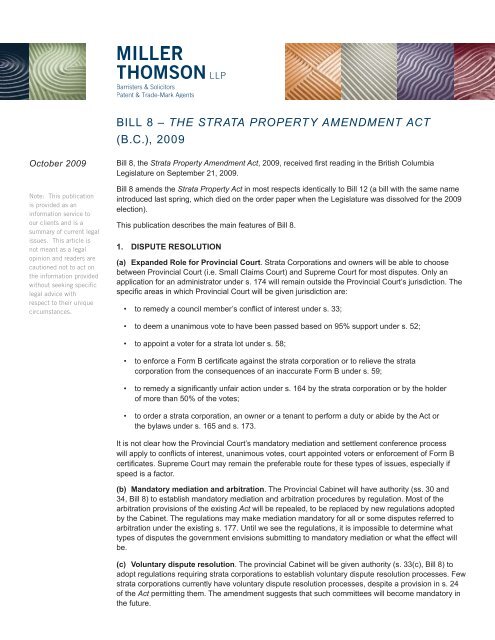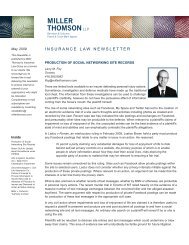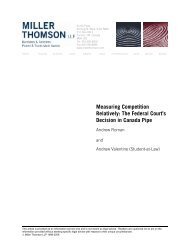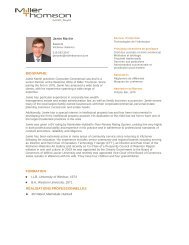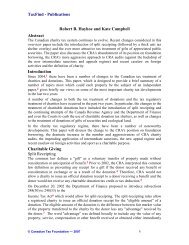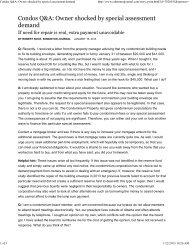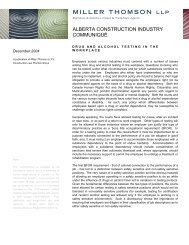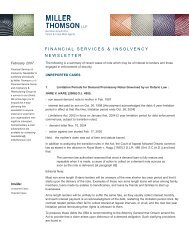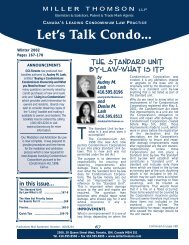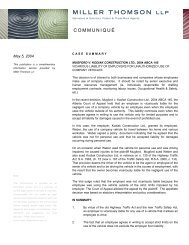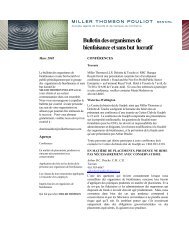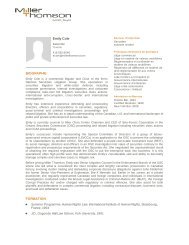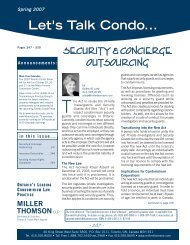Bill 8 – The STraTa ProPerTy amendmenT acT ... - Miller Thomson
Bill 8 – The STraTa ProPerTy amendmenT acT ... - Miller Thomson
Bill 8 – The STraTa ProPerTy amendmenT acT ... - Miller Thomson
Create successful ePaper yourself
Turn your PDF publications into a flip-book with our unique Google optimized e-Paper software.
2.Finances(a) Mandatory depreciation reports. Depreciation reports under s. 94 of the Act will becomemandatory, unless overridden by a ¾ vote resolution at a general meeting (s. 15, <strong>Bill</strong> 8). <strong>The</strong> intervalbetween reports will be established by regulation, and any waiver will have to be renewed for eachperiod. It will also be mandatory for a depreciation report to be prepared by a “qualified person” to bedefined in forthcoming regulations, and to contain specific types of information also specified in theregulations.<strong>The</strong> forthcoming regulations may exempt certain classes of strata corporations from the requirement(very small strata corporations, bare land strata corporations, and strata corporations where no unitshave ever been sold come to mind). It remains to be seen whether the regulations will tie contingencyfund contributions directly to the depreciation report, or leave that to be decided by the owners, as isnow the case.(b) Mandatory audits. Audited financial statements will be mandatory under amendments to s. 103of the Act, unless overridden by a ¾ vote resolution on a periodic basis (s. 16, <strong>Bill</strong> 8). Forthcomingregulations may exempt certain classes of strata corporations from the audit requirement.3.Special levies(a) Segregation and repayment of funds. Special levy funds will be required under amendments tos. 108 of the Act to be accounted for separately from the operating fund and contingency reserve fund(s. 17, <strong>Bill</strong> 8), and interest will be permitted on overdue special levies, either by a bylaw provision orin the actual resolution. Excess special levy funds greater than $100 per owner will be required to berepaid to the current owners (s. 17, <strong>Bill</strong> 8). This eliminates an ambiguity in the existing provision whichwas sometimes interpreted as requiring repayment to an owner who had sold in the meantime.(b) Court imposed special levy. A new provision (s. 25, <strong>Bill</strong> 8) will be added to s. 173 of the Actpermitting a strata corporation to apply to court (being either B.C. Supreme Court or Provincial Court)for approval of a special levy if the levy receives majority support at a general meeting but not enoughto pass a ¾ vote. <strong>The</strong> provision will only apply if the funds are required for maintenance or repairsnecessary to ensure safety or prevent significant loss or damage. This is the same test that applies toemergency expenditures by the council under s. 98.4.Administrator’s powersSection 174 of the Act will be amended (s. 26, <strong>Bill</strong> 8) to give the court clear authority to exempt a courtappointedadministrator from a requirement to obtain approval from the owners if that approval wouldnormally be required (such as a ¾ vote to approve a special levy for building repairs).5.Communications by e-mailNotices given by and to the strata corporation will be legally effective where sent by e-mail (s. 13 and14, <strong>Bill</strong> 8). In the case of notices to owners and tenants, s. 61 of the Act will be amended to permitnotice to an email address provided by the person. In the case of notices to the strata corporation, s.63 will be amended to permit notices to be e-mailed to “the strata corporation’s e-mail address” or toan e-mail address provided by a council member. An e-mail notice will be deemed to have been givenfour days after it is e-mailed; there is no requirement for evidence of receipt.Legal service on a strata corporation must still be carried out by personal service on a council memberor registered mail to the mailing address on record at LTO.<strong>The</strong>re is no provision to establish a strata corporation’s e-mail address. <strong>The</strong> Forms X and D, filed inthe Land Title Office, may need to be amended to include a line for an email address.6.Governance(a) Conflicts of interest. <strong>The</strong> scope of council members’ conflicts of interest that must be disclosedunder s. 32 will be expanded (s. 4, <strong>Bill</strong> 8) beyond transactions with the strata corporation, to include all2
matters in which a member has an interest that could result in a conflict with his/her duties as a councilmember.(b) Council hearings. <strong>The</strong> provisions of the Act giving an owner or tenant the right to request acouncil hearing, formerly set out in section 15 of the Standard Bylaws, will be moved (ss. 6 and 35. <strong>Bill</strong>8) to the Act as s. 34.1. This will prevent a strata corporation from repealing these rights by amendingthe bylaws.(c) Requisitions by owners. <strong>The</strong> threshold for owners to requisition a general meeting under s. 43of the Act or to place a resolution on the agenda of a general meeting under s. 46 will be reduced from25% of owners to 20% (s. 9, <strong>Bill</strong> 8).(d) Direction of council. <strong>The</strong> power of the owners under s. 27 of the Act to direct or restrict thestrata council will be circumscribed (s. 3, <strong>Bill</strong> 8) by preventing a s. 27 resolution from directing thecouncil with respect to whether a person is required to pay the costs of remedying a contravention ofthe bylaws under s. 133, or whether an owner is exempted from a rental restriction bylaw for hardshipunder s. 144.7.Bylaws(a) Age bylaws. Section 123 of the Act will be amended to expressly permit age bylaws that mightotherwise offend the Human Rights Code (s. 18, <strong>Bill</strong> 8).(b) Restriction on amendments in new strata corporation. <strong>The</strong> period during which amendmentsto the bylaws of a new strata corporation are restricted will be amended under Section 127 of the Actto end at the second AGM instead of the first AGM (s. 20, <strong>Bill</strong> 8). Fully non-residential strata plans andnon-residential sections continue to be exempt from the restriction.(c) Filing requirements. <strong>The</strong> requirement for bylaw amendments to be filed in the Land Title Officewithin 60 days will be removed from s. 128 of the Act (s. 21, <strong>Bill</strong> 8). Bylaw amendments will remainineffective until filed. This removes the ambiguity in the existing provision, which was unclear aboutwhether amendments could be filed later than 60 days after adoption.8.Rental restrictions(a) Cap on rentals. Section 142 of the Act will be amended (s. 22, <strong>Bill</strong> 8) to clarify that a strata lotrented to an owner’s family member or under a hardship exemption does not count as a rented stratalot for purposes of a bylaw that caps the number or percentage of rentals.(b) Deferred application of rental restriction bylaws. Section 143 of the Act will be amended (s. 23,<strong>Bill</strong> 8) to make a rental restriction bylaw passed by the owner developer before the first conveyanceeffective immediately regardless of whether the developer filed a rental disclosure statement; andto clarify that a rental disclosure statement protects the right of the first owner other than the ownerdeveloper to rent, even where that owner purchased under an assigned purchase and sale agreement.<strong>The</strong> existing provision is ambiguous on this point.(c) Hardship exemptions. Section 144 of the Act will be amended (s. 24, <strong>Bill</strong> 8) to extend the periodfor holding a hearing with respect to a hardship exemption from three weeks to four weeks. It will alsobe amended to provide that the exemption is granted automatically if the owner requests a hearing andthe strata corporation fails to hold the hearing within the four-week period. <strong>The</strong> current provisions fordeemed approval remain: if a hearing is held but the council fails to give a written decision within oneweek; if no hearing is requested and the council fails to give a written decision within two weeks. <strong>The</strong>current provisions are silent on what happens if a hearing is requested but not held.(d) Developer’s rental disclosure statement. <strong>The</strong> rules on expiry of a developers’ rental disclosurestatement under section 143(2) have been simplified. A rental disclosure statement will now apply toevery owner of the strata unit until the period set out in the disclosure expires, regardless of any stratacorporation bylaw restricting rentals.
9.Information and records(a) Additional records to be kept. <strong>The</strong> list of documents that must be retained by a stratacorporation under s. 35 of the Act will be expanded to include auditors’ reports, depreciation reportsand reports on repair or maintenance of major items (s. 7, <strong>Bill</strong> 8). <strong>The</strong> length of time for which suchreports must be retained will be specified in the Strata Property Regulation and is not yet determined.(b) Rights of former owners and tenants. Former owners and tenants will have the right under s.36 of the Act (s. 8, <strong>Bill</strong> 8) to obtain documents and records from a strata corporation that relate to theperiod during which they were owners and tenants.(c) Information for prospective purchasers. A Form B certificate under s. 59 of the Act will berequired to include information on parking stalls and storage lockers allocated to a strata lot, and themost recent depreciation report obtained by the strata corporation (s. 12, <strong>Bill</strong> 8). It is not clear whetheror how strata corporations should provide information on parking where the developer has takencontrol of parking by way of a registered or unregistered lease.10. Leasehold strata plansSection 216 of the Act is amended to provide that on conversion of a leasehold strata plan tofreehold, any occupancy restrictions filed under s. 206 of the Act cease to apply.<strong>Miller</strong> <strong>Thomson</strong> B.C. Strata Property GroupFor more information, please contact:Lynn Ramsay lramsay@millerthomson.comMichael Walker mwalker@millerthomson.comSharon MacMillan smacmillan@millerthomson.comwww.millerthomson.com© <strong>Miller</strong> <strong>Thomson</strong> llp, 2009. All Rights Reserved. AllIntellectual Property Rights including copyright in thispublication are owned by <strong>Miller</strong> <strong>Thomson</strong> llp.This publication may be reproduced and distributedin its entirety provided no alterations are made tothe form or content. Any other form of reproductionor distribution requires the prior written consentof <strong>Miller</strong> <strong>Thomson</strong> llp, which may be requested at:mt_vancouver@millerthomson.com


